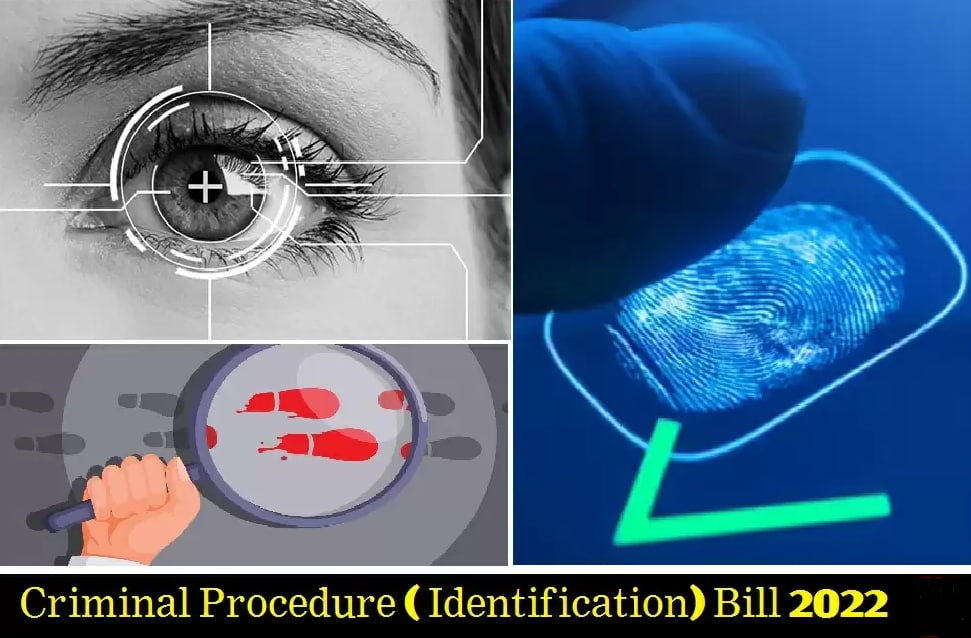New Criminal Procedure Bill

Copyright infringement is not intended
Context: The Lok Sabha on 4th April passed the Criminal Procedure (Identification) Bill, 2022.
Details
- The Lok Sabha on 4th April passed the Criminal Procedure (Identification) Bill, 2022, by voice vote.
- The Union government stated that the sole purpose is to improve the conviction rate in the country and to safeguard the human rights of law-abiding citizens.
- According to the 2020 National Crime Records Bureau (NCRB);
- Conviction rate in Murder cases was just 44%
- Conviction rate in Rape cases was just 39%
- 24% in cases of attempted murder
- 38% in robbery
- 29% in dacoity cases
- The Union government has stated that the Bill aimed to provide the police with the essential resources for securing convictions in court.
Key Features of the Bill :
- The Criminal Procedure (Identification) Bill, 2022, would allow the police and prison authorities to collect, store and analyse physical and biological samples, including retina and iris scans.
- The Bill empowers the police to collect finger impressions, palm print impressions, footprint impressions, iris and retina scans, footprint impressions, physical, and biological samples and their analysis, behavioural attributes including signatures, handwriting or any other examination.
- Biological samples can be forcibly collected from the convicted or persons arrested for crimes against women or children, or in case the crime attracts a minimum of 7 years’ jail.
- It can also be taken on the order of a magistrate to assist the investigation.
- The Bill also seeks to apply these provisions to persons held under any preventive detention law.
- As per the provisions of the new Bill any person convicted, arrested or detained under any preventive detention law will be required to provide the above-mentioned measurements to the police or a prison official.
- If any person resists or refuses to allow the taking of such measurements, it shall be lawful for the police officer or prison officer to take such measurements in such manner as may be prescribed.
- Resistance to or refusal to allow the taking of measurements under this Act shall be deemed to be an offence under section 186 of the Indian Penal Code.
- It would authorise the police to take and preserve records of convicts and other persons for the purpose of identification and investigations.
- It would repeal the existing Identification of Prisoners Act, 1920.
Implementing body
- The National Crime Records Bureau (NCRB) will be the repository of physical and biological samples, signatures and handwriting data that can be preserved for at least 75 years.
- The State Government and Union territory Administration may notify an appropriate body to collect preserve and share the measurements in their respective jurisdictions.
Arguments in favour of the Bill
- It will Protect the Human rights of the law-abiding victims of crime
- It will improve the conviction rate in the country.
- It will ensure a foolproof mechanism to prevent any data leak or misuse.
- Providing the sample will be voluntary for a person detained under any preventive law, they could not be forced to give the sample.
- No analysis or brain-mapping test would be performed without the person’s approval.
Arguments against the Bill
- The issue of data protection.
- Possible misuse of the proposed law.
- Violation of the citizen’s right to privacy and other fundamental rights.
Criminal Justice System in India
- The Criminal Justice System in India is a century-old system established by the colonial power.
- This system hardly experienced any substantial changes even after 70 years of Independence.
- The Criminal Justice system includes the agencies of government charged with enforcing law and order, deciding criminal offences, and correcting criminal conduct.
- The criminal justice system has the power to control crime and punish criminals and ensure rule of law in society.
- Source of Criminal law in India: Indian Penal Code of 1860, Protection of Civil Rights Act 1955, etc.
- The Criminal Justice System investigates, decides whether a person is guilty or not, and then imposes penalties on those who violate the established laws.
- Criminal law and criminal procedure are part of the concurrent list of the 7th schedule of the constitution.
Why reform the Indian Criminal Justice System?
- Less than 20% of the total people booked for criminal offences are finally convicted. Low rate of conviction points to the inefficiency of the Criminal Justice System in India.
- Century-old Indian Criminal Justice System has promoted dissatisfaction among people due to its lengthy and costly nature and also increased the burden on the judiciary.
- Lack of Cooperation and coordination among the judiciary, the prosecution and the police.
- A large number of guilty go unpunished. On the other hand, many innocent people remain as undertrial prisoners as well. According to NCRB data, 67% of our total prison population comprises undertrial prisoners.
- The nature of crime is changing fast in the world of digital connectivity and technological innovations.
Steps were taken by the government to reform the system
-
- The entire Code of Criminal Procedure (CrPC) was amended in 1973.
- The Vohra Committee was appointed for reforming the Criminal Justice System in India.
- Malimath Committee was formed by the government to suggest reform in the Indian criminal justice system.
- Adoption of “National Litigation Policy 2010” to transform government into an Efficient and Responsible litigant.
- Legal Information Management and Briefing System (LIMBS), was created in 2015 with the Objectives of tracking cases to which the government is a party.
- Nearly 99% of the police stations in the country have been linked to the Crime and Criminal Tracking Network and Systems.



1.png)
